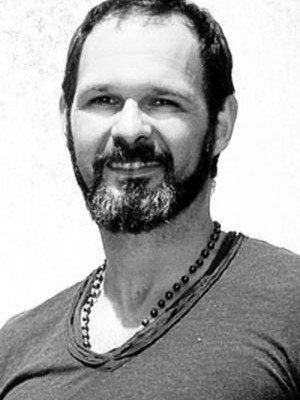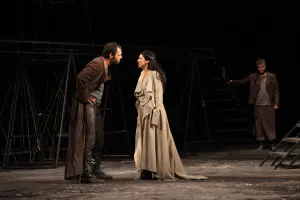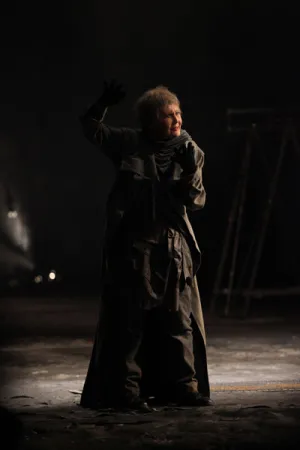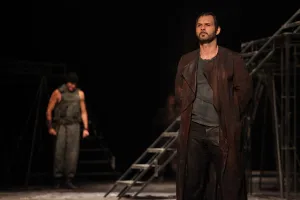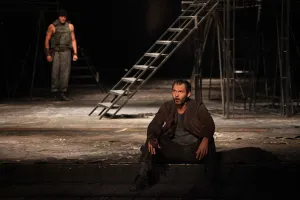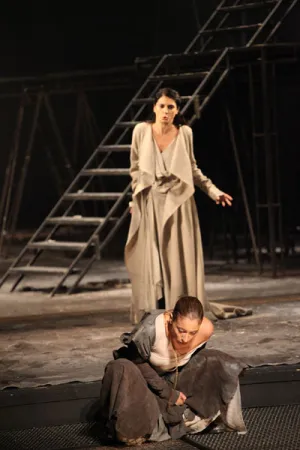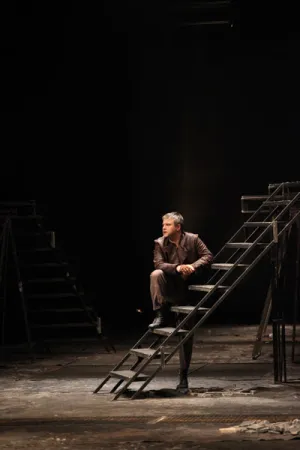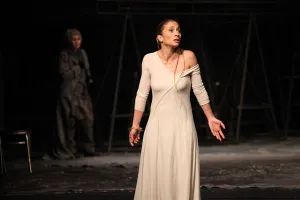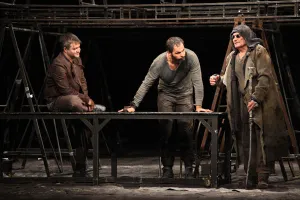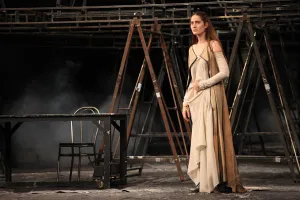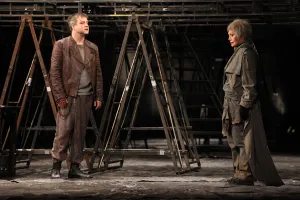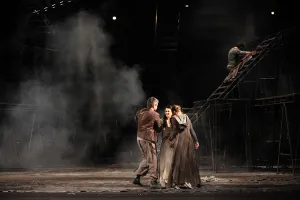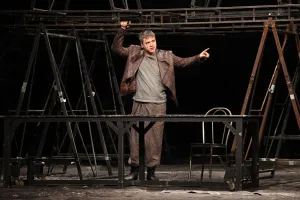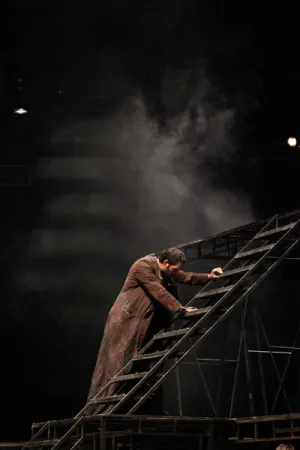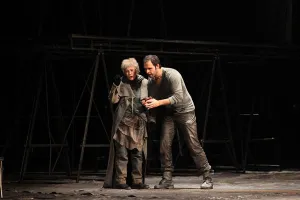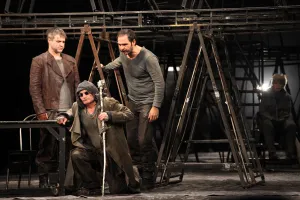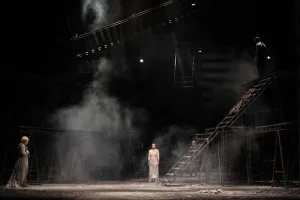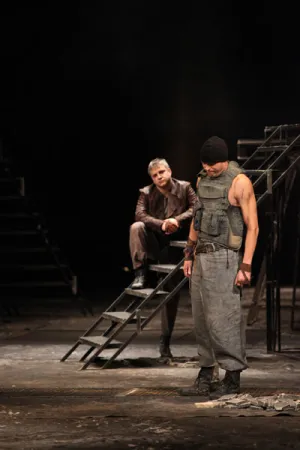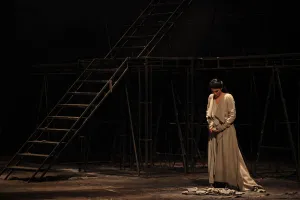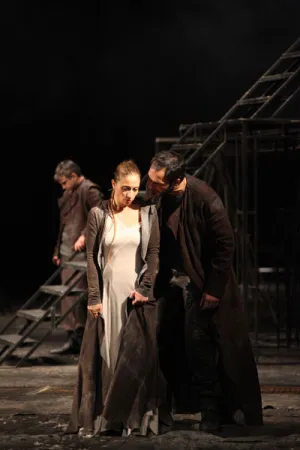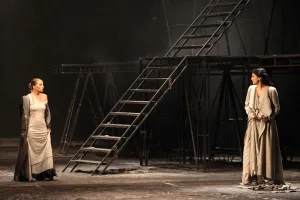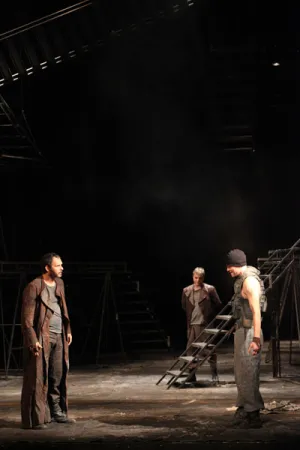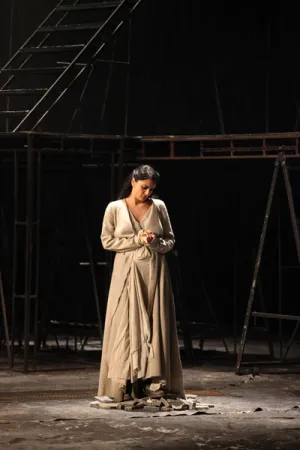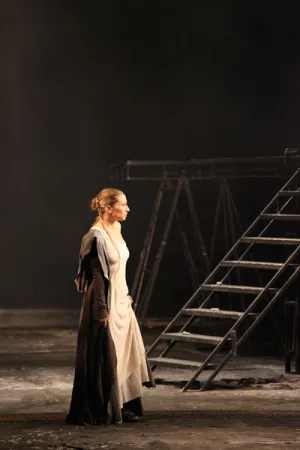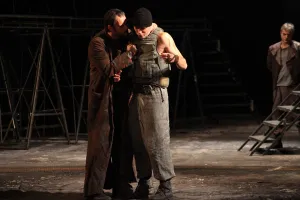Antigone
tragedy by Sophocles

ABOUT ANTIGONE
... The myth dramatized in Sophocles’ Antigone belongs to Theban legends and cannot be found in Homer’s epics; it could be that Sophocles took it from an epic we have not heard about. After Oedipus left the Thebes, his twin sons, Polyneices and Eteocles, remain Theban rulers. They are supposed to co-rule the Thebes and change on the throne after a year. However, Eteocles, who was the first to rule, refuses to give the throne to his brother when the year ended. Then, with the help of his father in law, Polyneices gathers an army and goes to conquer Thebes. They have the city in siege, but eventually luck betrays them. When he sees that his army is about to be defeated and in order to stop further bloodshed, Polyneices proposes to settle the issue in a duel between himself and Eteocles. Unfortunately, they both die in duel. Their uncle, Creon, takes over the command of the army and manages to defeat the conquerors. Thebes is free; Creon is the new king. He does not allow burial of dead conquerors – therefore, the brother of Antigone, Polyneices, is to be left unburied as well.
By forbidding Polyneices’ burial, Creon is merely obeying the law of Athens that prohibits burials of enemies of state and those who desecrate temples or steal gifts to gods. On the other hand, family of a deceased person is obliged to bury the dead, at least symbolically, as Antigone does, by covering the dead brother’s body with a thin layer of dirt. The dead belong to the underground world and to gods who rule in it; a dead soul can find peace in the world of the dead only if they had a burial. Soul of an unburied person cannot reach Hades, the realm of the dead; instead, it roams around like a ghost. Such a soul can focus its anger on people who did not fulfil their duty. Therefore, the person who prohibits the burial can be punished more severely than the family.
This is where Antigone starts…
Zoran Milutinović
Sophocles, Antigone, Zavod za udžbenike, Belgrade, 2009
... Antigone defies Creon’s decision; she decides to disobey his burial prohibition for her brother Polyneices, who attacked his hometown of Thebes and fought their brother Eteocles. A woman opposes a man and a sovereign. She dears to disobey human laws of power and sovereignty, in the name of laws of eternal gods. She is punished for this. However, her judge receives even more severe punishment. Thus, the circle of hubris is closed. When a man steps over the set boundaries and interferes into gods’ affairs, the punishment is imminent: exile or death. It is often death…
Gaga Rosić
Sophocles, Antigone, Stubovi kulture, Belgrade 2011
...The tragedy is condensed, compact, dignified, it asks for an adequate gesture and tone…
… Antigone is an imposing figure, who makes her way into the world of heroes during her lifetime … Antigone is one of the most famous Greek heroines. Brave, consistent, loving, with a great sense of duty – a wonderful and dignified character. Her faith in gods, dignity and sacrifice shown towards her poor father Oedipus, by following him for years throughout the world –all make her divine character in the eyes of the people. And yet, she has to face the preordained doom, which must be fulfilled!
… She must bury her dead brother, because it is her obligation as a sister, as a kin.
… She is not afraid of death, because she can never escape it, and now the death comes as a salvation from all the misery and pain she suffers from the doom rested on her family. “It is better to die than to live miserably”…
“I know who should be pleased the most” – and Antigone knew indeed. She knew, because she was born that way. She loved her dead brother in spite of all the earthly laws…
Antigone’s ecstasy opens the cosmos and spreads the vision of freedom beyond everyday duties… “I was born for love, not for hatred.” And this is the poetry beyond night and day.
Marija Crnobori
From “The World of Acting”, Sterija’s Pozorje, Novi Sad, 1991
 ABOUT THE POET
ABOUT THE POET
Sophocles was born around 495 BC. Besides his prolific career as a writer, Sophocles also served to the state, he held significant positions in Athenian society… While the other two great Greek tragedy writers, Aeschylus and Euripides, left their country and went to courts of kings, Sophocles remained home. He must have made this decision based on his opinion that, as he says in one of his texts, “Those who serve the tyrant are his slaves, regardless it may seem that they are free”… Sophocles died several months after Euripides, in autumn of 406 BC, at the age of ninety. He was buried in his family tomb near the road to Deceleia. The people proclaimed him the hero Dexion and visited his grave every year. A public official, Licurgus had the Sophocles’ statue, together with Aeschylus’ and Euripides’, placed in a theatre and his plays copied and kept in the State’s archive. The famous statue situated in Lutheran Museum, representing the poet as an impressive man is considered the copy of this statue. Sophocles’ first artistic triumph at the drama competition took place when he was very young; he triumphed over Aeschylus, most probably with Triptolemus in 468 BC, during the rule of archon Aphsephion. At the drama competitions, Aeschylus was victorious 13 times, Euripides only 5 times, while Sophocles won at these competitions 24 times, more than any other ancient Greek tragedy playwright… Aristophanes of Byzantium knew 130 Sophocles’ plays, out of which we know 114 by their names. From the whole Sophocles’ opus, only seven tragedies survived in a complete form. Namely: Ajax, Electra, Oedipus the King, Antigone, Oedipus at Colonus, The Women of Trachis, Philoctetes. …
Sophocles tragedies mostly follow the Aeschylus’ tradition… Sophocles changes and adapts the essence of a myth only by introducing opinions of his own time. He is different from Aeschylus by not chanting a simple tragedy in which the situation lingers and remains under a religious idea and one and only impression; instead, he designs a comprehensive and intricate tragedy in which the situation changes from a scene to a scene, alike the viewers’ impressions as well… By doing so, he keeps the power and influence of gods, or diminishes their influence, and he transfers developments into the realm of human personality, reduced to their own strengths… Therefore, the trait that characterises Sophocles’ drama is character and he exploits the character psychologically to their full depths by not descending to the realism of everyday life as Euripides does… In the design of his characters, Sophocles likes to build the characters of opposite nature in order to contrast and emphasise the strengths of the hero’s character… In order to portray diversity of feelings, Sophocles is the first tragedian who introduced female characters into his plays; female characters did not exist in Aeschylus’ dramas, who was male by all of his being. We can see it merely by counting Sophocles’ plays named after female heroes, they are more than double than in Aeschylus’ opus. He portrayed the female gentility and sacrifice (Antigone), restless love (Tecmessa), liveliness and gullibility (Jocasta), self-indulgence and vanity (Clytemnestra), revengeful bitterness (Electra), adulterous love (Phaedra), explored their jealousy (Deianeira, Hermione, Procris), but he never portrayed the phenomenon of love itself, only its devastating consequences…
When it comes to language, Sophocles also, when compared to Aeschylus, introduces novelties… When readers, after the strong and original language by Aeschylus, pay attention to Sophocles’ language, the first thing they can notice is the sunny clarity of Sophocles’ language, its easiness and perfect flexibility, its preciseness and expressiveness… While Aeschylus’ language resembles the language of a poet and musician, the Sophocles’ is the means used by the dramatist… Sophocles has also been said to have introduced various novelties in theatre. The first one is the set, or theatrical painting. The second one is the introduction of the third actor. The number remained constant, not only in tragedies, but in comedies as well… The third novelty is enlargement of a chorus from 12 to 15 members. Sophocles’ also influenced the role of chorus… Sophocles’ chorus does not affect the plot, the chorus is merely a passive observer and, truth be told, the chorus follows the plot with great interest, but it does not exceed the common people regarding the comprehension of a situation. If Aeschylus is a greater poet and religious person, Sophocles is greater dramatist and artist… While Aeschylus acted in his own dramas… the elegant Sophocles could never be an actor due to his social position. He acted in Nausicaa to show his skill with a ball and in Thamyras because he liked to sing with a lyre…
Miloš N. Ðurić
From: Sophocles, Antigone, Gutenberg Gallaxy, Valjevo, 1998
 JAGOŠ MARKOVIĆ
JAGOŠ MARKOVIĆ
Jagoš is one of our most prominent theatre directors. He graduated at the Faculty of Dramatic Arts in Belgrade, from the class of Professors Borjana Prodanović and Svetozar Rapajić. Some of Marković’s numerous productions include The Twelfth Night, Telephone Booth, Skup (The Miser) and Suspicious Person (Yugoslav Drama Theatre); The Glembays, Family Stories, The House of Bernarda Alba, Tulumbus (Atelier 212); The Hundred Loop Stocking (Belgrade Drama Theatre); Christine (Royal Dramatic Theatre Dramaten, Stockholm); The Seagull, Filumena Marturano and opera Carmen (Croatian National Theatre “Ivan pl. Zajc”, Rijeka); Comedy of Errors (Montenegrin National Theatre); Hecuba (Royal Theatre “Zetski Dom”); Romeo and Juliet, A Midsummer Night’s Dream, Wizard of Oz (“Boško Buha” Theatre); Kate Kapuralica (National Theatre of Sombor); Decameron, A Day Before (joint production of NT Sombor and City Theatre Budva), etc. Jagoš Marković’s play The Telephone Booth has been produced by several directors and in several languages in the Festival “Balkans is reading Jagoš” in Bulgaria. Jagoš Marković won more than forty awards from juries of professionals, at festivals and national awards including “Bojan Stupica” Award, Belgrade Liberation Award, “July 13th” Award, Award for his overall contribution to art in Montenegro, Award for Drama at the City Theatre Festival in Budva, Davidoff Award, several “Sterija” Awards, “Zlatni ćuran” and “Ardalion” awards, Award for the Best Director at the Festival in Kotor…
When Ljubomir Simović gave Jagoš the “Mića Popović” Award in June 2004, he said the following about him as an artist, “When staging a play, Jagoš always sees something that no one has seen before. He makes even the old and already known things seem new and unknown. He makes a discrete gesture, but that gesture changes everything. (…) Jagoš changes the metaphors from the original text radically, with great courage. However, he does not do that only as a director, for he is not only a director in the theatre. In fact, he is everything in the theatre: he is an actor and a whole ensemble, he is the audience, the stage and the theatre box, the first, the second and the third gallery, he is the theatre library, he is the brush and the paint, the hammer and the nail, the ropes and the lights, the silk and the fire, the sets and the curtain. He is all of that probably to show us that the world without love is only a dry, salty and barren sea floor, which is the same what Apostle Paul says about love in The First Epistle to the Corinthians.” His first production in the National Theatre was The Learned Women (1990); his productions on the current repertoire of drama stage in the National Theatre are The Wife of Hassanaga (Hasanaginica), Mrs. Cabinet Minister’s Wife (Gospođa Ministarka), The Upstart (Pokondirena tikva), PhD (Dr) and the operas Cinderella and The Marriage of Figaro.
Premiere performance
Premiere 30 December 2012 / Yugoslav Drama Theatre / “Ljuba Tadić” Stage
Translated by Miloš Ðurić
Director Jagoš Marković
Dramaturge Molina Udovički Fotez
Set Designer Jagoš Marković
Costume Designer Bojana Nikitović
Stage Speech PhD Ljiljana Mrkić Popović
Sound Design Vladimir Petričević
Producer Borislav Balać
Premiere Cast:
Antigone Vanja Ejdus
Creon Dragan Mićanović
Ismene Vjera Mujović
Chorus Ðurðija Cvetić
Tiresias Mihailo Janketić
Sentry Bojan Krivokapić
Messenger Aleksandar Srećković
Eurydice Sloboda Mićalović Ćetković
Haemon Momčilo Otašević
Entourage, Guards Stefan Bjeladinović, Zoran Trifunović / Nikola Lazović
Assistant Director Ivana Nenadović
Project producer Nemanja Konstantinović
Stage Manager Sandra Rokvić
Prompter Danica Stevanović
Painter Matija Vučićević
Assistant Set Designer Magdalena Vlajić
Assistant Costume Designer Stefan Savković and Srđan Perić
Make-Up Dragoljub Jeremić
Lighting Operator Miodrag Milivojević
Sound Operator Tihomir Savić
Set crew Chief Zoran Mirić
Set and costumes were produced in the National theatre workshops.





